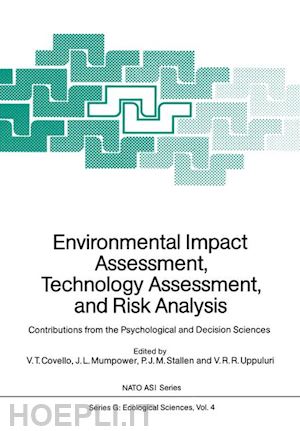Section I. Overview.- Social & Behavioral Research on Risk: Uses in Risk Management Decisionmaking.- Risk Theory and the Environmental Assessment Process.- Assessing Long-Range Cumulative Impacts.- The Impact of EIA on Decisionmaking.- Opportunities for the Social Sciences in Risk Analysis — An Engineer’s View Point.- Section II. Psychological Perspectives.- 1: Theoretical and Methodological Contributions.- The Framing of Decisions and the Psychology of Choice.- Rating the Risks: The Structure of Expert and Lay Perceptions.- Large-Scale Risk as a Problem of Technological, Psychological, and Political Judgment.- Psychological Perspectives on Technology as Societal Option, Source of Hazard, and Generator of Environmental Impacts.- Prediction. Diagnosis, and Causal Thinking in Forecasting.- Risk Judgment and the Communication of Hazard Information: Toward a New Look in the Study of Risk Perception.- Who’s Afraid of Technological Risk?: An Attempt to Model Reasonable Emotions.- Psychological Aspects of Scenarios.- 2: Case Studies.- The Empirical Investigation of Citizens’ Preferences with Respect to Four Energy Scenarios.- Attitude Studies by the IAEA/IIASA Risk Assessment Group.- Structure of Public Opinion, Nuclear Debate, and Risk Assessment: A French Survey.- Improving Scientists’ Judgments of Risk.- Section III. Decision and System Science Perspectives.- 1: Theoretical and Methodological Contributions.- Issues in Evaluating Risks of Fatalities.- Natural and Technical Hazards: Similarities and Differences.- Illusions and Mirages in Public Policy.- The Multiple Perspective Concept: Bridging the Gap Between Analysts and Decisionmakers.- The Delphi Technique.- Expert Judgment for Human Reliability in Risk Analysis.- Scientific and Technological Uncertainty inQuantitative Assessment and Policy Analysis.- 2: Case Studies.- An Approach for Assessing Health Risks Associated with Alternative Ambient Air Quality Standards.- A Decision-Analytic Technology Assessment of Public-Key Cryptography.- An Asbestos Hazard Index for Managing Friable Asbestos Insulating Material.- The Social Compatibility of Energy Technologies — Theoretical and Empirical Approaches in West Germany.- Section IV. Cultural and Philosophical Perspectives: Theoretical and Methodological Contributions.- Limits of Rationality.- Three Types of Risk Assessment: A Methodological Analysis.- From Public Perception of Risk to Cultural Theory of Technology.- Section V. Policy Analytic, Administrative, and Legal Perspectives: Theoretical and Methodological Contributions.- Public Disputes about Risky Technologies: Stakeholders and Arenas.- Heuristic Opinion and Preference Evaluation Research for Assessing Technological Options — A User’s View.- Canvey Island: The Dynamics of a Major Technological Risk Assessment.- Political Decisionmaking and Scientific Indeterminancy.- Standard-Setting Standards: A Systematic Approach to Managing Public Health and Safety Risks.- Law, Risk Management and the Influence of the Psychological and Decision Sciences.











